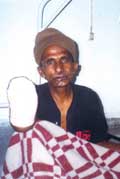The code of conduct signed between the government and the rebels has no currency in the Rapti. It received little publicity and even less respect. None of the signatories initiated a monitoring body for the region and it's business as usual for the Maoists. Extortion in the name of 'donations' and free food and lodging are still demanded from the people. The locals are compelled to present themselves at Maoist mass meetings and prevented from attending the activities organised by other political parties. Those who fled at the height of the insurgency have been unable to return home.
The Maoist militia strut along the village streets, displaying weapons conspicuously. The government agencies violate the code of conduct too. They have failed to make public the details of those that are missing and have not sought the release of those still in custody. Travellers are still frisked and their belongings rifled through at every checkpoint. The army and the police have not let up their patrols and recently began erecting new posts.
It is an uneasy peace that has returned to the villages of the Rapti after the ceasefire. Violence, terror and destruction don't shadow the streets and the villagers are hopeful that the talks will usher in a lasting peace. But into the second round of the peace talks, it is plain that the Maoist rebels still have a hold over this corner of Nepal. Ironically, the comrades in the Rapti are eager for the success of the talks. A regional level Maoist cadre declares, "The peace talks must succeed no matter what the cost, we will not let anything stall the process." His eagerness is difficult to interpret accurately-it could either be a ruse to mask other intentions or a genuinely felt sentiment.
The disillusionment with living underground as fugitives in the jungle is clear among the Maoists that have returned to the villages. In conversations with several Maoists, there was a palpable sense of weariness with the path of the gun. Some are ready to permanently lay down their weapons, turn to peaceful politics and start afresh in their villages. There have been those among them that have done exactly that, leaving the revolutionary path for the road home.
The villagers, however, are wary and suspicious of the Maoists' intention to turn a new leaf: "They are too used to getting what they want through the power of intimidation.they will find the life of an ordinary farmer too difficult .they are accustomed to the luxury of power," are comments that are made out of Maoist earshot.
In the meantime, the rebels are working at convincing the people that their path was justified. On the one hand, they use all party 'roundtable' meetings as forums for them to publicise their agenda. They justify their activities as a commitment toward a 'political solution'. In an attempt to come across as the pro-peace group, the Maoists have begun a negative campaign against the Nepali Congress and the UML, portraying them as obstacles in the peace negotiations. On the other, they have not slowed their recruitment campaigns in the villages. Although the Maoists have been demanding a merger between the Royal Nepali Army and their 'people's army' for the creation of a united national army, they continue to hold advanced guerilla training. The trained guerillas from the west are being transferred to the east hills, which proves they are keen to develop military capabilities in the east that equals their advantage in the west. If the villagers are to be believed, their drive to recruit young people has accelerated.
Despite the huge public interest their leaders attract in urban areas, the Maoist cadres in rural Nepal have long fallen from their pedestals. Survival is key, and the people in the Rapti have learned to stay neutral or keep their distance. The one section who are unafraid to raise their voices are the victims of war. They demand compensation regardless of which side their perpetrators belonged to, a statement of public remorse from the state and the rebels, education for their children, medical care for the wounded, and rehabilitation and employment for families.
While those who have proof of death could gain a small measure of comfort from closure, far too many families are caught in a grey area. Their loved ones, those classified 'missing'-neither the government nor the rebels have disclosed details about those who have been missing in the duration of this eight-year long civil war.
Bishnu Prakash Giri, a farmer of Kalagaun, Salyan was abducted by the Maoists five years ago. His family has not heard of him since. "If they killed him, they should have said so," says his wife Dila Giri. "At least I could have performed his last rites." Two years ago, in a similar case, security forces came and took away Nar Bir BK of Ratamata, Rukum. Nothing is known of his whereabouts. Despite the ceasefire, the Maoists are still keeping dozens of other people captive in jails and labour camps. The fighting may have ended for the moment but stray sniper bullets and landmines still kill the innocent. The hills that were booby-trapped by rebels and security forces to decimate each other have now begun to reap another harvest among the innocent.
Durga Bahadur Khatri of Lekhpokhara was lucky to escape with his life when a booby trap explosive went off while he was ploughing his field. The 54-year-old fell unconscious after losing his right hand and the skin on his face was torn to ribbons. Khatri was brought in a critical condition to Kathmandu's
Bir Hospital.
The Maoists destroyed the airport towers at Chaurjhari and Salle, ruined the Dang-Salyan road, set fire to countless government and VDC offices, uprooted trail bridges, telephone and electricity towers. They continue to destroy and attack private property: the Maoists are not honouring their commitment to the ceasefire.

Bishnu Prakash Giri's family are still waiting for him five years after Maoists abducted him from his home in Kalagaun, Salyan


The ruins of the Agriculture Service Centre and Animal Health Post in Tharmare, Salyan. (Left) The Maoists gutted Nepali Congress worker Bikram Singh Rathor's house in Badagaun, Salyan, after the ceasefire was declared.(Right)


Durga Bahadur Khatri (right) finally on the road to recovery at Bir Hospital. Nar Bir BK (left) of Kholagaun, Rukum has not been heard of since security forces arrested him two years ago.
The revolution and the witch
The Maoists' "new regime" is not very different from the old one in its treatment towards women. Bharat Thapa and his wife Kalasa Thapa of Iriwang, Rolpa are political activists. When the rebels failed to gain their sympathy, Kalasa was declared a witch. They instigated a local woman to claim that she fell ill after after Kalasa ate a frog in an occult ritual. Three village jana-sarkar heads officially heard the complaint filed by the woman on 23 March. The judges had her arrested although Kalasa pleaded innocent to the charges. When we visited Iriwang she was serving a prison sentence for practicing witchcraft.


